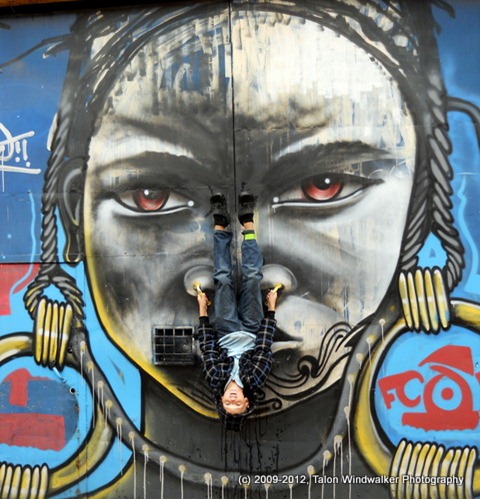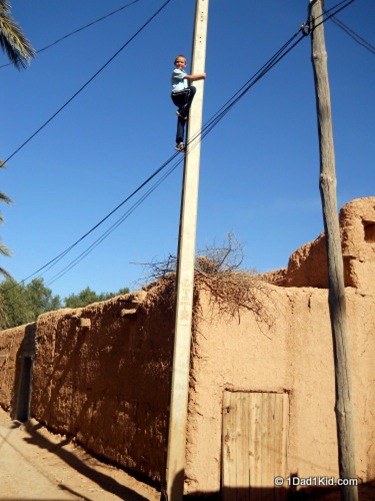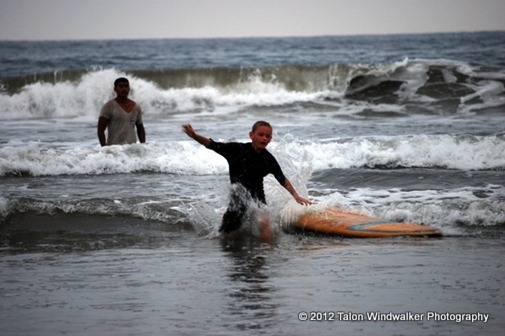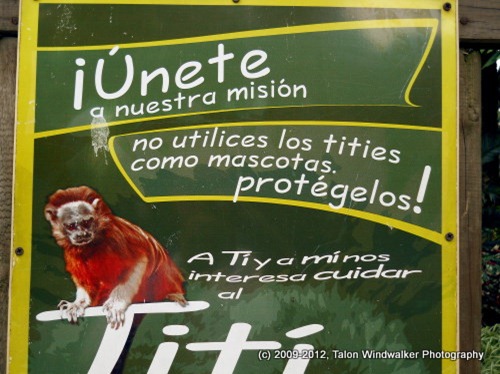I had lots of practice parenting before Tigger moved in with me. Every child is different, and you have to adjust your parental settings to meet their individual needs, as well as to find what works and doesn’t work for them.
For instance, you were practically killing my stepdaughter if you grounded her from the phone. But do that to my stepson, and he’d laugh at you. He couldn’t care less. For him you had to hit his electronics or his pocketbook to get his attention.
For a while I had two very different parenting styles going on in the home. Talk about trying!
This nomadic life, though, brought more changes to our lifestyle than just where we slept. In many deep ways, a life of travel has drastically altered my parental settings.
By the way, make sure you go to the end so you can get Tigger’s opinions on what is good parenting.
Independence
Our life and location in Colorado didn’t allow Tigger much independence. A walk to the local convenience store meant crossing an extremely busy street. Since he was attending a school through open choice, it wasn’t our local one, which meant all of his school friends weren’t readily accessible.
However, things changed drastically in Honduras. I could walk from one of the island to the other in about 35 minutes. Everyone knew him. He could pop into a store and ask “Have you seen my dad?” and they knew exactly who he meant. Utila was incredibly safe. If we were having dinner somewhere, and he was bored of all the adult talk, I had no concerns with him walking home by himself at night.
I have had to let go of fear.
It was huge for his continued development and really helped nail the coffin in his previously poorly controlled anxiety. By the time we left the island, he was more self confident, off all his medications, and was thriving like crazy.
On Utila, he was also certified as a junior open water diver, and to celebrate his Forever Day, we went to nearby Roatan and did a shark dive. My little 10-year-old was dwarfed by the large female reef sharks as they circled him, and he couldn’t have been happier.
I have had to let go of fear. No, I really don’t want to see him scrambling up a power pole (yes, he did) or hanging over the edge of the top of a 3-story building (yes again), but I also don’t want him raised in a world that frightens him. It’s paid off because as he matures, he thinks things through more. He has fun but without taking risks that aren’t necessary. Sometimes he’ll start to do something and stops saying “That’s probably not a wise choice.” I’m always happy to agree with him on that.
Language
I’ve been online friends with Lainie of Raising Miro since before we left the States (and we finally got meet in Peru!). After a discussion about her son’s potty mouth, it really struck me how silly it is that we treat words with so much power. Naturally, some words can be quite offensive and destructive, but really what’s the big deal with my kid using the same language I myself sometimes use? I was relieved to find out that Theodora of Escape Artistes has a similar opinion. I have tremendous respect for both of these women, and my interactions with them really helped me to take a step back and rethink things.
Why is there some magic number that decides that saying shit or damn is suddenly okay?
When I decided to let Tigger communicate without fear of saying “a bad word,” I noticed immediately how much more freely he communicated. We were having much deeper conversations and much more open and honest communication.
And I felt like less of a hypocrite.
Instead of trying to limit his vocabulary, we focus on “there’s a time and a place.” Dropping the F bomb at home is different than when he’s playing with the neighbor’s 6 year old. His mom may not appreciate that.
It’s more about respect than blacklisted words.
Big Boys Don’t Cry
I was raised with that ridiculous teaching. I have never agreed with it. However, sometimes little boys do cry over silly things or just to get their way. (I’m sure little girls do, too.) Having had mostly older kids before, I didn’t have to deal with it. Tigger was almost the youngest in his foster home, and I think he had perfected the water works routine. Boy, he could sure turn them on when he wanted!
We focused on “Is that something we cry about?” In calmer moments we had discussed crying when we’re in pain, frustrated, emotionally hurt, etc. Crying because you can’t have chocolate? Not so much.
Well, okay, I actually get that one. (I’m quite sure Sally would agree with him, too.)
Gender Stupidity
Everyone knows blue is for boys, and pink is for girls, right?
Who came up with that rule? I’ve yet to see a color with a penis or vagina. Therefore, we operate under the premise that colors are gender neutral.
There are no genders for colors, unlike when I was growing up.
Recently, I’ve seen this come into play in an interesting way. My son enjoys the animated TV show My Little Pony: Friendship is Magic and recently changed his Skype name and avatar to reflect one of his favorite characters, Pinkie.
I haven’t said a word to him, but it made me fill with pride that he had no problem declaring his love for My Little Pony to his friends and had no problem using a pink pony as his profile photo.
Honest Communication
My childhood was at the tail end of “Children should be seen and not heard.” Since the egg donor (I refuse to call her a mom) was a single parent, and me an only child, I was around a lot of adults. Generally, it was okay for me to join in conversations. Just as long as I didn’t contradict the Wicked Witch.
My son and I have a very open communication style. We are honest with each other while still being respectful of each other. We have no forbidden topics.
He’s free to join my conversations with other adults, and it’s often quite interesting to hear what his thoughts are and what he’s passionate about.
Because I said so!
How do children learn to think if we never explain the rationale behind our decisions? Yes, sometimes it’s a power play on their part, and I simply repeat my request and accompany it with “the look” in those moments. Once things are taken care of, then I explain the rationale. I see one of my primary responsibilities as raising a child who can think for himself.
If it’s something that doesn’t involve safety and/or isn’t time sensitive, then I’ll take the time to explain first.
When he asks a question, rather than telling him to look it up or giving him the answer, I take the opportunity to engage him in thinking about it the question and working through a situation. Likewise, if he’s struggling with something. Rather than just fixing it for him, I try to gently guide him in problem solving.
Whereas before I parented with the “I’m the parent, you’re the kid, end of discussion” model, now we’re more of a team for most things. Travel decisions, financial decisions, etc., are something we discuss together.
When he wanted me to buy him a new game for $40, I simply pointed out that in the last 2 days we had spent over $110 fixing his computer. “That’s too much money,” he replied and put the game back. Because we work together on finances, he understands that $110 could easily be 1-2 plane tickets, a week’s lodging, etc.
“You’re the parent. You could just make me go,” was a response I got recently when discussing how I wanted to go somewhere but he didn’t.
“That’s not how we operate. We’re a team.” We discussed how if a place was really important to one of us, that out of respect we would go with the other person. If it isn’t a big deal, then we compromise. In this case, the location was really important to me, so he readily agreed we would go there.
We do the same with housesitting assignments. Before I’ll apply for one, we chat about it and make the decision together. I’ve ignored several sits I’d love to do because he had strong feelings about them.
I love visiting ruins, temples, and churches, him not so much. Unless he’s thoroughly sick of them, he tags along and doesn’t complain when I’m stopping to photograph something for the 300th time. Likewise, I’ll go with him to the mall for hours so that he can search for video game stores and look at every single game he can find.
I eat local food, and he’s a typical American kid when it comes to his tastes. Sometimes I’ll suck it up and go to McDonald’s for him, or some similar place, and other times we’re doing Indian (or whatever), and he can find something he likes. We check in with each other to see if the other person feels strongly about a certain type of cuisine before picking a place.
The dreaded sex talk and basic sexuality
When I asked where babies came from at age 6, I was handed a book written for curious children. It was implied that we would not be discussing the book or its contents, and I was never asked if I had questions.
Again, we’re open here, too. The questions have sometimes been quite. . . interesting, especially since puberty has begun. But no matter how much I’m crawling inside my skin, I answer questions frankly, completely, nonchalantly, and I ask if he has more questions.
Although, I doubt any of his questions will beat a former child’s query from the back seat of our car: How do girls masturbate?
Since he moved in with me, he’s known I’m gay. I know that sexual orientation is not a choice. (No matter how hard I’ve tried, I have not been able to make myself straight.) So I’ve explained that it’s like how some people are born with blue eyes and some with brown. They don’t really have any control over that, and neither eye color makes them a better or worse person.
While I assume he will be straight when he grows up, I have no way of knowing for sure. Therefore, I don’t use restrictive language with him. I don’t want to set in his mind that I have certain expectations: When you meet a boy or girl that you like and want to kiss. . . If you decide to get married or live with someone. . . If you decide to have children. . .
“It matters not what a person is born, but who they choose to be.”—J.K. Rowling
Values
While I want to raise a child with a strong sense of values and morals, I don’t necessarily feel he has to be brainwashed to believe the way I do. Discussions are framed as “some people believe. . . I believe. . . scientists say. . . “
Often when he asks a question, I first ask for his opinion and insight. Then I can ask followup questions to lead him through a critical thinking process that allows his own voice to emerge. Sometimes I offer alternate ways of looking at something, but generally I avoid approaching topics as if I have the final word or the only right way of looking at something.
He has good manners because I use them as well.
Part of my goals in raising a compassionate child is to look at the world with an open mind and heart. Religion, gender, age, race, sexuality, etc., are not valid criteria for determining who someone is. I hope that by modeling this behavior for him, it becomes part of his own makeup.
I am very careful with discussing spiritual issues as well because I believe it is best that he find what works best for himself, what resonates strongest within him. If he asks questions, I answer them honestly. When we visit different places of worship, I explain beliefs, cultural practices, etc., in a way that does not imply judgment.
“That’ sounds stupid,” he used to occasionally say.
“It isn’t stupid. They just believe differently than others.”
I love it now whenever I hear him say “Well, everybody’s different.”
Respect
I don’t believe that simply bringing a child into the world automatically entitles one to be respected by said child. Too often it seems that children are treated more like property than as living beings with their own personalities, traits, beliefs, etc.
My son treats me with respect because that is how he is treated.
Part of that respect is admitting when I’m wrong and apologizing. I’m most definitely not a perfect parent by any stretch of the imagination. Sometimes I have the patience of a honey badger and yell, complete with swearing and flailing arms, while my sensitive, huge-hearted child sits there with tears streaming down his cheeks.
Once I’m finally calm, I apologize. When he tells me it’s okay, I thank him but explain that type of behavior I exhibited is not appropriate and uncalled for. He knows I’m still working on controlling that better.
Likewise, after he’s been a bit snarky with me or something, he will, on his own, come to me and apologize. We’ll discuss our mutual feelings, then move on.
Children become what they’re labeled
Kids typically aim to please. If they’re told they’re stupid, worthless, a pain in the ass, etc., they will endeavor to meet that.
I have suffered my whole life from the messages I was exposed to as a child. I am almost 45, and I still battle against those internal tapes.
There is no “bad” decision. There are wise choices and poor choices.
“Have I been a good boy?” he used to ask me.
“You’re always good.”
“But yesterday I did [whatever he did].”
“You made a poor choice. I make poor choices sometimes, too. Perfect people don’t exist, but even when you make a poor choice, you’re still a good person.”
While I may not always keep my cool the way I would like, I am always careful to control what comes flying out of my mouth. I know all too well the damaging power of verbal messages. I never call a behavior or choice “stupid.” Instead, I use the term “silly” or “poor choice.”
I never want my child to associate the word “stupid” with himself.
I try to make sure he hears more about all the things he does right (using specifics) than he does about the occasional oops!
And Tigger’s 2 cents
“I really think that some parents should let their children drink a little bit of wine, so when they’re old enough to drink they aren’t drinking a lot. [Yes, I give him sips of my drinks occasionally.]
“I think kids should be allowed to make their own mistakes (parents shouldn’t be overprotective) and stuff like that. The same with letting them join in your conversations.
“Don’t force your kids to eat vegetables. They should have to try it, but don’t make them eat like half a plate. They’re good for you, but if you start them out eating small amounts, they’ll eat bigger amounts on their own as they get older.”
What parental settings have you changed (or plan on changing)?











March 15, 2013
Wow! Talon, I admired you a lot already, but now I do even more! What a lucky child this Tigger is… We have the same principles with our girls and I find that full-time traveling as a family and living in closed quarters really makes you work on your stuff and respect one another on a very real level. It is sometimes hard and intense and your post is a balm on my sorry heart tonight (I had one of those blow you describe with my little Mathilde earlier tonight when she got a little sulky with me and I raised my voice, swore and well… was just not the loving mom I strive to be most of the time…). The girls have been bickering with one another a lot lately and we are all fighting for space in the trailer, but as you say, kids live in the moment and they make me see such amazing things in the midst of the tougher moments. We are so blessed to have them as our greatest teachers!
March 15, 2013
I hate those moments. Especially when you’re in the middle of them and are talking to yourself about how ridiculous you’re being but can’t stop it midstream.
They sure are wonderful teachers!
March 10, 2013
Children become what they are labeled. This is so true and the statement hit me square in the face as I try to define why we want to live a nomadic life as a family. There are so many reasons to want this lifestyle and you and Tigger are a testament to those reasons. I want to raise our son to love himself first, fear nothing but fear itself and the value in living in the moment (he is an expert in this area already, we want to preserve that way of thinking). You are an example on teaching these things and thanks so much for that:)
March 10, 2013
Yes, kids are absolute pros at living in the moment. We could learn so much from them.
Thanks for the lovely compliment as well! I’m so glad to hear our sharing helps others.
March 10, 2013
Tigger’s had a rad life of travel. I can only imagine how cultured and accepting he’ll be when he grows up. I like his quotes – He’s a young yoga, that one.
March 10, 2013
I tell him often I’m very jealous of his life. Yes, he’s my little Buddha for sure. 🙂
March 10, 2013
He sounds like my lovely daughter. We call her our “free range child” and while other people might sniff at our methods-unschooling and pretty much everything you’ve described above- I sure am proud of my amazing kid.
It’s amazing, how they turn out when you let them be themselves
March 10, 2013
Definitely a free-range child. I think it’s an awesome way to grow up!
March 8, 2013
This is so heart-warming! What a lucky kid your son is to have a father like you!
Oh, and I *hate* the whole blue-for-boys, pink-for-girls thing. It’s so ludicrous. Colours are colours; no penises or vaginas attached, as you say! I’m male and I used to love My Little Pony too, play with Barbies and dress up in my mum’s swimming costumes when I was younger. My mum also used to dress me in pink when I was a baby just to fuck with people’s heads. I love her for that!
I’m not a parent myself, but I’ve heard that http://birdsandbeesandkids.com/ is a really good place to find sane and helpful advice on how to talk to kids about sex and sexuality.
March 9, 2013
I think it’s really how uptight many parents are about having that conversation with their children. Yes, it can be uncomfortable at times, if you grew up in a situation where sex was a “dirty” thing and never discussed, but it’s so important. I’ve practiced open communication with every kid in my home, and it’s amazing what they’ll come and ask once they see they not only won’t get in trouble but that you’ll have an honest conversation with them. I’d MUCH rather they ask me than other kids.
March 8, 2013
Loving this; I am a work in progress as I think all parents are, but connecting with families like yourselves helps me tons to keep on the right track! We unschool our two girls and I think this would be far easier if we were travelling/in a community with like-minded people, but we are doing our best with the situation we are in at the moment.
You are a lovely family and we love following you on your journey!
March 9, 2013
I think the people who want to be good parents are constantly a work in progress. Our kids are constantly changing. We have to be willing and able to change with them.
Thanks for following along!
March 8, 2013
I think I have changed all of these as well. I love all the poiints you have laid out here. I agree with each and every one of them. It is hard to not repeat what we are taught our whole lives and it took me years to see how much better this works for our family. I am grateful everyday for the changes I have made and for others like yourself brave enough to shout it out! Well done!
March 9, 2013
Thanks, Mary! Parenting is definitely a process. If a person wants to be a better parent, they can’t be stagnant. Always evolving, adjusting, reassessing. Can be exhausting but so worth it!
March 8, 2013
I couldn’t agree with you more. I may be having the “language talk” with my almost 10 year old soon. I know how I spoke at that age, and I know how his friends speak too. I just don’t know if *I’m* ready yet to hear him dropping F-bombs.
Keep doing what you guys are doing, you’re doing it well. It’s refreshing to read about it.
March 9, 2013
It took some getting used to it for me as well. We’ve had this policy for about a year now, and every so often I still cringe when he says the F word. LOL
March 8, 2013
This is amazing, Talon 🙂 I love your rationale behind each of your decisions – you know what you want to achieve(and why) and have thought about how you’re going to get there, you’ve reflected and made changes along the way to adapt to how your relationship/son has evolved. You make a brilliant teacher, I wish that more kids could have a teacher of life skills (aka parent) like you!
Keep up the great work – you’re not only giving your son the world, but giving the world a great son!
🙂
March 9, 2013
Thank you, Kate! Your comment made my day. 🙂
March 8, 2013
You know what strikes me about this? I find it interesting that we who were so damaged as children, who have every excuse to be toxic parents ourselves, have instead sworn that our children won’t suffer the same fates we did. I am so on board with everything you’ve said above, especially so with my 10 y/o daughter (and yes, the waterworks are active in girls, too!). I’m afraid my 20 y/o son wasn’t quite as fortunate, but one thing he has intact is his self-esteem, and we have a good relationship. Makes you wonder what in us avoided the toxic parent route, doesn’t it, when so many people don’t or can’t.
March 8, 2013
I have often wondered how that happened. Why do some kids get raised in an abusive home and turn into abusive people who commit crimes, do drugs, and devalue their own life, yet others go the opposite direction. I wonder what the turning point is. It seems like some of us have a spark and some don’t.
March 8, 2013
ah, i love this SO much. because bonne has it right – you’re raising a strong, independent thinker who CARES. just like you. i love this – almost in tears, because it is SO RIGHT.
March 8, 2013
Thank you, Jessie!
March 8, 2013
The best part of this message Talon, to me, is he will repeat this parenting style with his own children..and the cycle of abuse finally stops with his generation. My siblings and I raised our children, though not perfectly, without the verbal and physical abuse we suffered. We now get to enjoy watching them raise our grandchildren the same way, but just a little better than we did them. I love it!
March 8, 2013
Yes! When I went into therapy years ago, that’s exactly what I told my therapist: The chain gets broken with me. Even though part of me doesn’t want him to grow up, the other part is eager to see what kind of life he’ll have as an adult. If he decides to have kids, they’re going to be some lucky children.
March 8, 2013
He does have great manners. Abi and I talked about it after we said good-bye to the two of you. To come up to two complete strangers and be so confident, polite and friendly for a boy of his age was so good to see. I love his take on vegetables. :o)
March 8, 2013
Yes, I’m COMPLETELY with him about vegetables! LOL
Thank you! I love watching him with new people. I get to see just how much he’s changed over the years.
March 8, 2013
I was nodding my head in agreement for most of the time i spent reading this. Treat your kid like a person who has feelings, opinions, thoughts and fears and your kid will learn to do the same.
I’ve always felt that while children may need additional structure and rules than you would apply than traveling with a friend, you cannot force your desires. Well, you can, but in the long run it will come back to bite you in the ass. As for wine, food, making choices, also, yes. It’s important to find a middle ground and the only way to do that is by talking and hearing what your kid has to say. And vice versa for that matter.
March 8, 2013
I think it’s one of the reasons that I’ve had less issues with my teens. I treat them with respect and like they have a brain. I think all of us do better when we feel like we’re respected, no?
March 8, 2013
What an incredible post. The vast majority of the world’s problems would simply vanish if children were raised with this kind of loving, respectful, open, exploratory parenting. Thanks for the inspiration and for showing that it is possible to rise above abuse and become a great parent.
March 8, 2013
I agree that the world would be a much better place if that were to happen. People raised with respect and love tend to return that to others.
I think it’s so important for people to know they don’t have to keep the cycle of abuse alive. It IS possible to break the chain.